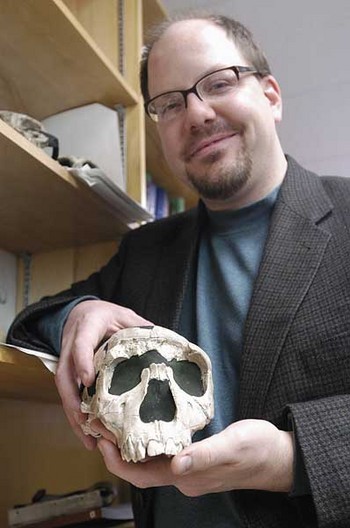John Hawks explores how celiac disease evolved
Celiac disease is an evolutionary paradox, says UW–Madison anthropologist John Hawks.
Celiac disease results from a reaction to the gluten in wheat and some other grains, in which a person’s immune system essentially attacks the gut lining. Since the disease interferes with nutrient absorption from food, it would be expected to have negative impacts on evolutionary fitness — yet it is relatively common in populations with an established history of wheat and other grain agriculture, including many in western Europe.
“That history is really interesting to us from an anthropological standpoint because gluten is a really large component of our diets today, but it hasn’t been for very long,” Hawks says. Since wheat was domesticated only about 10,000 years ago, celiac disease may have arisen as a side effect of recent genetic adaptations.
Hawks gave a keynote presentation on Wednesday, Sept. 25, at the 2013 International Celiac Disease Symposium in Chicago. His talk focused on the history of celiac disease and how he is using it to explore how complex gene networks have responded to environmental changes during recent human evolution.
“There is a connection between the way things work together and the way things evolve,” Hawks says. “We are looking at how human genes evolved in the recent past to get an idea of how those genes work, especially in complex phenotypes.”
The risk of developing celiac disease is known to have a strong genetic component, much of which is based on immune system molecules called human leukocyte antigens, or HLAs. HLAs are one of the most diverse systems of genes in the human genome, with more genetic variants in the modern human population than any other type of gene. These molecules stud the surfaces of cells and help the immune system recognize “self” versus invading pathogens.
Infectious diseases likely became a bigger problem as population density increased following the rise of agriculture, Hawks says, and may have allowed favorable effects of strong immunity to outweigh detrimental side effects such as autoimmune reactions. Protection against disease is known to be a powerful driving force for human evolution, with the malaria protection afforded by sickle cell anemia as one of the best-known examples.
Earlier this summer, Hawks and former graduate student Aaron Sams published evidence of changes in other, non-HLA genes related to celiac disease risk. However, recent results suggest that the genetics of celiac disease may not have been driven by recent evolution. Instead, Hawks says, “We learned that celiac disease is something that is probably characteristic of much more ancient humans.”
Work is ongoing to better understand how functional networks of different genes shift and co-evolve in response to environmental changes. Hawks also hopes to look at other autoimmune disorders, such as type 1 diabetes.
Tags: health & medicine, research




